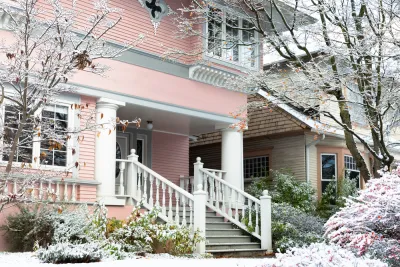Seattle is the latest in a series of cities, states, and counties to alter the landscape of land use regulation by approving what the Sightline Institute describes as the "most progressive" ADU policy in the United States.

Seattle has approved a landmark law that would both allow the developments of accessory dwelling units and limit the size of single-family residential projects. Planetizen referred to the law in May as ADUs for mansionization control, and a "two-birds-with-one stone" situation.
Dan Bertolet and Margaret Morales broke the news shortly after the Seattle City Council unanimously approved the law yesterday, and provide the context to appreciate the scope of Seattle's legislative accomplishment for the potential of adding new residential density to the city:
The adopted changes amount to the most progressive ADU policy in the US. By boosting the addition of ADU homes in the three-quarters of Seattle’s residential land reserved for expensive, single-detached houses, the new rules will lower the invisible walls of economic exclusion, and make the city greener too.
Bertolet and Morales also describe the effect of the law at the other end of the spectrum:
The legislation’s house size limit of 2,500 square feet on a typical lot will make it more attractive to add ADUs to existing houses instead of tearing those houses down. And when teardowns inevitably occur—as they already do under the status quo—the size cap will provide a new incentive to build ADUs along with the new house. Neighborhoods will see fewer teardowns replaced by McMansions and more modest, mixed-income options.
The article also details the political process that yielded the final law, which includes last-minute deal making and a four-year build up. The article also expresses support for the new law, listing the potential affordability and environmental benefits of the additional density enabled by the law. Despite calling the new law "the best" ADUs regulations in the country, Bertolet and Morales still share a few tweaks that could make the law "even better."
The news from Seattle comes shortly after Oregon passed landmark legislation that ends single-family zoning in most cities in the state, allowing duplexes, triplexes, and fourplexes for all properties zoned for single-family residential in cities over 25,000.
FULL STORY: SEATTLE SAYS YES TO THE BEST RULES IN AMERICA FOR BACKYARD COTTAGES

National Parks Layoffs Will Cause Communities to Lose Billions
Thousands of essential park workers were laid off this week, just before the busy spring break season.

Retro-silient?: America’s First “Eco-burb,” The Woodlands Turns 50
A master-planned community north of Houston offers lessons on green infrastructure and resilient design, but falls short of its founder’s lofty affordability and walkability goals.

Delivering for America Plan Will Downgrade Mail Service in at Least 49.5 Percent of Zip Codes
Republican and Democrat lawmakers criticize the plan for its disproportionate negative impact on rural communities.

Test News Post 1
This is a summary

Test News Headline 46
Test for the image on the front page.

Balancing Bombs and Butterflies: How the National Guard Protects a Rare Species
The National Guard at Fort Indiantown Gap uses GIS technology and land management strategies to balance military training with conservation efforts, ensuring the survival of the rare eastern regal fritillary butterfly.
Urban Design for Planners 1: Software Tools
This six-course series explores essential urban design concepts using open source software and equips planners with the tools they need to participate fully in the urban design process.
Planning for Universal Design
Learn the tools for implementing Universal Design in planning regulations.
EMC Planning Group, Inc.
Planetizen
Planetizen
Mpact (formerly Rail~Volution)
Great Falls Development Authority, Inc.
HUDs Office of Policy Development and Research
NYU Wagner Graduate School of Public Service





























